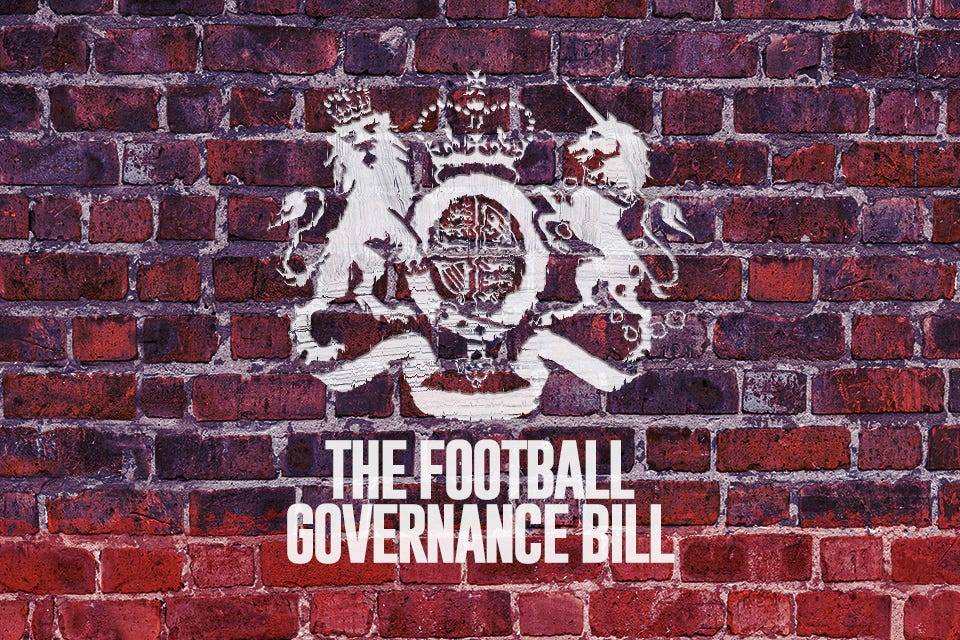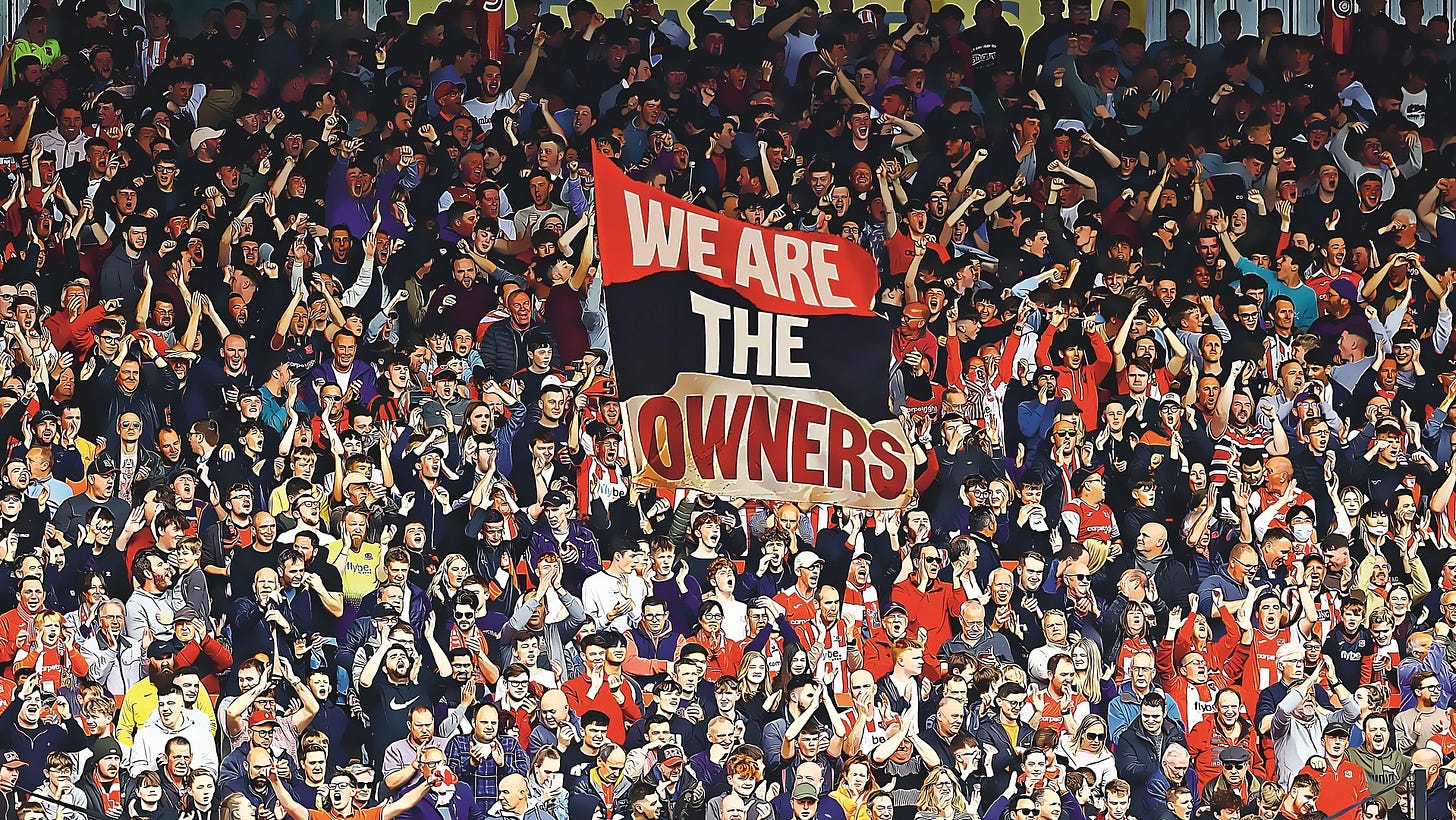Six Ways the Football Governance Act Stops Crime in English Football
The Football Governance Act 2025 is not a silver bullet, but it does aim to strip power from those who treat clubs like money-laundering shell corporations.
Passed into law last week, the Football Governance Act 2025 marks a once-in-a-generation shake-up of English football. After years of financial collapses, opaque takeovers, and fans being steamrolled by distant owners, England has finally introduced a system of independent oversight to the sport.
The Act creates an independent football regulator (IFR) with sweeping powers: to license clubs, veto rogue owners, and step in before crises unfold. It is, in effect, English football’s first serious answer to its long-running governance problem and could shield the sport from both financial ruin and criminal exploitation.
Fans may wonder why they should care. It means their club is less likely to be owned by a fraudster, flogged to a mystery consortium, or thrown into administration because someone gambled away its future.
Below, we break down six key reforms from the Act, ranked by their potential to combat corruption and criminal abuse.
1. Stronger Vetting of Owners and Directors
What it does:
Clubs in the top five tiers of English football must now pass a robust Owners’ and Directors’ Test (ODT), overseen by the OFR. It goes beyond prior league-administered checks by including mandatory reviews of source of wealth, criminal background, and business competency.
Why it matters for crime:
This closes a major loophole that allowed clubs to become vehicles for money laundering, fraud, or ego-driven disaster capitalism. The regulator can now reject or eject owners who fail to pass muster, and it has the power to force a sale if necessary.
Example:
Massimo Cellino, former Leeds United owner, was disqualified in 2015 under the old Owners’ and Directors’ Test after a tax‑evasion conviction was judged a “dishonest act”. But this only came after months of wrangling and embarrassment. Under the new Act, his finances and integrity would have been scrutinized before the deal went through.
2. Anti-Collapse Measures
What it does:
The Act mandates that clubs maintain forward-looking financial health. They must submit business plans, prove solvency, and maintain appropriate reserves. The IFR will act as a live auditor, intervening if a club edges toward crisis.
Why it matters for crime:
Financial desperation is a key entry point for criminal actors. Clubs in peril often turn to opaque offshore loans, shady “rescue” buyers, or dodgy investment schemes—opening the door to tax fraud, embezzlement, or money laundering.
Example:
Bury FC, founded in 1885, was expelled from the English Football League on 27 August 2019 after falling into financial freefall. Wages went unpaid. The stadium deteriorated. Fans and local vendors were left hanging. No independent regulator intervened before it was too late.
Derby County came close to the same fate in 2021, entering administration with debts over £60 million and being rescued only after fire-sale prices and fan protests. Under the new system, the IFR would have flagged financial risk earlier and potentially forced ownership to stabilize the situation or step aside.
3. Club Licensing
What it does:
All clubs from the Premier League to the National League must now be licensed by the new IFR, which operates separately from the FA and leagues. Licenses can be suspended or revoked for serious non-compliance.
Why it matters for crime:
Licensing creates an enforcement mechanism for everything else. Clubs that falsify finances, hide ownership, or fail to engage fans risk suspension or even expulsion.
Example:
Charlton Athletic supporters remember 2020’s ownership fiasco: East Street Investments imploded, Paul Elliott failed the owners’ test, and injunctions froze the shares, leaving the club adrift. The EFL dithered for months. An independent regulator could have halted the chaos early and installed administrators.
4. Protection Against Illicit Breakaway Leagues
What it does:
The Act bans English clubs from joining unsanctioned, closed-shop competitions, like the short-lived European Super League (ESL), without approval from the IFR. The regulator can enforce this by denying licenses or applying heavy sanctions.
Why it matters for crime:
The ESL itself wasn’t criminal. But its architecture bore signs of corporate cartel behavior: secret pacts, offshore shell companies, and an attempt to engineer market domination with no promotion or relegation. It also showed how a handful of elite owners could bypass fans, federations, and even legal norms in pursuit of cash.
Case study:
In 2021, fans of Chelsea, Arsenal, Manchester City and Manchester United flooded the streets in protest against the ESL. Clubs backed down within days, but only because of public pressure. The Football Governance Act gives regulators legal grounds to kill such schemes at the root.
If owners try again, they now face license suspension and the loss of their right to operate within English football.
5. Fan Empowerment and Asset Protection
What it does:
Clubs must now engage with fans on key decisions and gain supporter approval before changing team names, badges, colors, or stadiums. Selling a club’s ground or relocating requires regulatory sign-off.
Why it matters for crime:
Owners have historically exploited club assets for personal gain, stripping stadiums, laundering brand value, or executing real estate plays behind closed doors. The new rules make asset-stripping harder and less profitable.
Case study:
Cardiff City’s controversial 2012 rebrand from blue to red, forced by owner Vincent Tan against fan wishes, might not have survived under these protections. Likewise, the 2002 relocation of Wimbledon FC to Milton Keynes, effectively erasing a century-old London club, could have triggered a regulatory veto.
These rules won’t stop every bad decision. But they institutionalize the fan veto and prevent owners from hijacking tradition for profit. Clubs aren’t just brands to be flipped. They’re local institutions, and the law now recognizes that.
6. Fairer Revenue Distribution with Backstop Powers
What it does:
If the Premier League and EFL can’t agree on a new financial distribution model, the regulator can impose one. This includes reviewing parachute payments, solidarity funds, and how broadcast revenue trickles down the pyramid.
Why it matters for crime:
Smaller clubs in financial freefall are vulnerable. They cut corners. They take questionable investment. They open their doors to actors looking to exploit the desperation. Reducing financial disparity is a way to starve the ecosystem of desperation that invites corruption.
Case study:
Oldham Athletic and Rochdale, both examples of clubs relegated out of the EFL—have teetered on the edge of financial collapse. Without steady income, clubs can rely on owners of unclear provenance or short-term debt packages tied to private real estate, further opening the door to money laundering opportunities.




Thank You for bringing me back to my MSc Thesis topic. 😊 It will be interesting to see how they will handle the Owner's Test for example regarding PIF and if the parachute payments will be truly revised as they are on of the main predictors in probability of bouncing back to higher league.